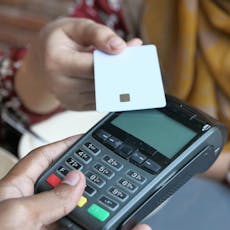Having a poor credit score can make it difficult to access credit. You may be able to get a bad credit credit card to help rebuild your credit history.
See which credit cards you're eligible for
Comparing won’t affect your credit score



By Matt Fernell, Editor at Finance.co.uk.

Getting approved for a credit card can be difficult if you have a poor credit history. If you need help getting approved, credit cards for bad credit can help. Here’s how to find a card that’s right for you.
If you have a poor credit record, it’s more important than ever to only apply for credit cards you’re eligible for. That’s why we will only ever show you the cards you’ve got the best chance of getting.
Get a decision and see deals in minutes
Compare cards from a range of top providers
Only see credit cards you’re eligible for
Check eligibility with no impact on your credit score
You can compare credit cards you’re likely to get side-by-side so you can compare easily and choose the best card for you.
So we can show you the cards most likely to accept your application, we just need some information about the following:
Your income: including how much you earn a year, your employment status and your start date
Your household: including your address, homeowner status and your mortgage contributions
Your personal details: including your name, date of birth, contact details, and number of dependents
We use this information to carry out a ‘soft check’ on your credit record. This will give us a good understanding of your eligibility so we can show you the cards you’re most likely to get.
Here are the things you should consider when choosing a credit card for bad credit:
Think about why you want the card to help you choose the right option. Your choices are likely to be limited if you have bad credit, but you still may be able to get a credit card for:
Interest-free purchases
Balance transfers
Building your credit score
Earning rewards for everyday spending
However, you won’t be able to access the best deals, and some card types may be unavailable to you. For example, the best 0% purchase cards may offer an interest-free period of 18 months, but you may be only able to get one for six months.
The annual percentage rate (APR) for bad credit credit cards is likely to be higher than average. This is the interest rate you’ll be charged if you don’t clear your balance every month.
It’s a good idea to pay off your credit card in full before interest is added, but if you don’t think you’ll be able to do this, look for a card with the lowest APR.
Most cards won’t show you this until you apply, but it’s worth only getting a card with a credit limit you can stay within. Choosing a low credit limit can help you control your spending, but don’t go over it.
Exceeding your credit limit will usually incur a fee and could further impact your credit score, making it even harder to borrow in the future.
If you have a poor credit history, you're not guaranteed to be accepted for a credit card, even when applying for a bad credit card.
To make sure you're not applying for cards you won't be approved for, it's helpful to use an eligibility checker to find cards you're more likely to qualify for before you apply.
A hard search is performed on your credit report when applying for a credit card. A hard search looks at your credit history in detail and leaves a mark that other lenders can see.
Too many hard searches in a short period of time can harm your credit rating, making it even tougher to get a credit card. It can suggest to lenders that you have been desperate for credit in the past.
Before applying for credit cards for very bad credit, check your eligibility first to prevent multiple hard searches. We perform a soft check on your credit report that doesn’t leave a mark or affect your score to show you the cards you’re eligible for.
To get any credit card in the UK, you need to:
Be over 18 or 21 with some providers
Have a permanent address in the UK
Be able to show you can afford to repay the card, i.e. have a steady income
They can be used to improve your credit rating
Card purchases are protected with section 75 cover
You're more likely to be accepted if you have a poor credit history
They usually come with much lower credit limits
They charge high interest rates on unpaid balances
You risk getting into debt and damaging your credit score further if not managed well
Credit cards aren't the only products you can turn to if you have a bad credit history and need funds.
If you need to borrow money to help cover a big expense, you could also look into applying for loans for bad credit. You're more likely to be approved for bad credit loans if you have a low credit score; however, they'll likely have high interest rates and charge expensive fees.
An overdraft facility may also be an option if you need to borrow a small amount of money. An overdraft is where you borrow money from your current account. This can be useful if you need small amounts, although the fees for using your overdraft can be expensive, so this should be a last resort.
The information provided does not constitute financial advice, it’s always important to do your own research to ensure a financial product is right for your circumstances. If you’re unsure you should contact an independent financial advisor.
We're on a mission to improve the finances of the nation by helping you to spend wisely and save money



We're on a mission to improve the finances of the nation by helping you to spend wisely and save money



You should wait at least six months between hard credit searches because this is when the searches stop influencing your credit rating.
When you apply for a credit card, the issuer will conduct a hard credit search on your credit report. This search looks at your credit history and leaves a mark on your file other lenders and card providers can see.
Too many marks from a hard credit search in a short time will likely harm your credit report because it suggests to lenders you're desperate for cash.
When lenders check your eligibility for a credit card, card issuers look at two things: your credit report and your affordability. If your application is unsuccessful, it may be because you don't have enough income to demonstrate you can cover the costs of the card, or it may mean your credit score is too low.
It's possible you may be applying for credit cards with eligibility criteria that are too strict for your current financial circumstances. Use a free credit card eligibility checker to understand which cards you have a greater chance of being approved for.
You do not need to have a job to get a credit card. However, you will be required to have regular income to show you can afford your bills and repayments.
This required income can come from anywhere, including universal credit, pensions, or inheritance. As long as you have a consistent cash flow, you should be able to get a credit card.
Although bad credit cards are designed for those with a poor credit rating, you still may struggle to get approved for one if your credit score is very poor.
If you find a lender willing to approve your application, you'll likely be charged a high interest rate and have a low credit limit.
To have a chance of getting approval for the best credit card deals, spending time improving your credit history will be your best option.